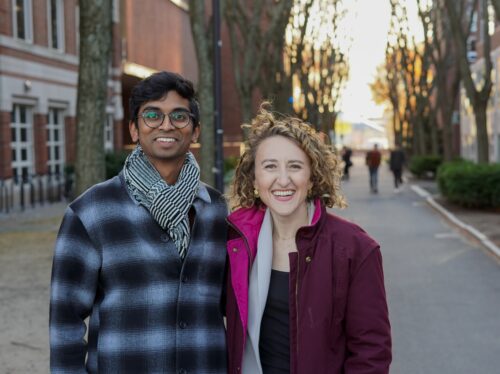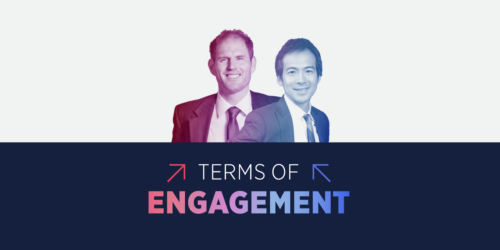What tactics are being used against racial equity policy and practice today in the United States? Why are anti-DEI activists specifically targeting universities? And how can antiracist advocates stay one step ahead?
Last week at the 2024 Truth and Transformation Conference, we explored these questions and more in an afternoon program hosted by the Institutional Antiracism and Accountability (IARA) Project, directed by Professor Khalil Gibran Muhammad.
An online audience of over 1200 equity allies came together to gain new insights and practical advice from a dynamic group of speakers, including Massachusetts Attorney General Andrea Campbell, bestselling author Jason Stanley, and Fearless Fund Co-Founder Ayana Parsons. In case you missed it, here are six key takeaways from this year’s edition.
1 – Make your commitments known
In the opening panel of the conference, speakers discussed their firsthand experiences coming face-to-face with anti-DEI campaigns in the past year. Representing diverse sectors — philanthropy, corporate, government, and journalism — they found common ground in the need to vocalize a firm stance in support of racial equity work.
For John Palfrey, President of the MacArthur Foundation, this means linking the defense of DEI directly to his foundation’s mission. As he explained, standing in solidarity against this pushback is not just relevant for philanthropy; it’s essential to its work. “Racial equity is a part of every program that we have,” he shared. “We are very clear that we continue to pursue it. We continue to say it is lawful, which it is.” Palfrey insisted that as long as racial inequities exist in Chicago and elsewhere, the Foundation is committed to fighting them.
By standing by commitments to advance racial equity — whether to staff, stakeholders, or the public — institutional leaders can stand united with one another and articulate a collective response. Dr. Shaun Harper, Executive Director of the USC Race and Equity Center and Forbes Contributor, underscored the importance of collective action: “Ultimately, we’re attempting to ignite a movement… It is uniting people who know better and who really care about our democracy to fight back and collectively clap back against these attacks on it.”
Along the same strategy, keynote speaker Massachusetts Attorney General Andrea Campbell urged constituents to demand sustained DEI initiatives from their Attorneys General, based on current legal standards. Attorneys General can provide influential input to legislators, advocate for racial equity legislation, and challenge the constitutionality of anti-DEI legislation.
2 – Use evidence to justify your equity work
Previous editions of Truth and Transformation have explored the need for evidence-based research on DEI and racial equity initiatives. This sixth edition went a step further, stressing the necessity for evidence-based outcomes. In light of the mounting legal and moral challenges to DEI this year, speakers agreed to fight back with truth — and data.
Ayana Parsons, Co-Founder of Fearless Fund, told the story of her organization’s first social impact report, published in 2023, as an example. Just months later, the American Alliance for Equal Rights, led by conservative activist Edward Blum, filed a lawsuit against their foundation’s grants to Black women entrepreneurs. The fund’s meticulous research in the report proved useful support for their case.
Discussing data-driven approaches, Dr. Shaun Harper light-heartedly noted, “KPIs [key performance indicators] are my love language.” He emphasized the strategic value of tracking metrics, advising organizations to respond with clear data: “My advice to organizations is to respond with evidence, show your work, show people what you’re doing in the name of DEI to prove that it’s not the ridiculousness that Christopher Rufo and others are recklessly claiming.”
Next to documenting the impact of DEI initiatives, it is equally important to continue to track anti-DEI legislation and assess the effects of anti-DEI efforts. Katherine Mangan, a senior editor from The Chronicle of Higher Education, a news site closely monitoring anti-DEI laws affecting colleges state-by-state, offered critical questions for the audience to consider: “What is going to be the fallout of these changes that are taking place, and what are we going to see in terms of student and faculty recruitment and retention? What are going to be the unintended — and probably intended — consequences?”
3 – Fight litigation when lawsuits are filed
When asked what can be learned from the lawsuit against the Fearless Fund, Ayana Parsons pointed to the concerted nature of attacks against race-conscious decision-making in the United States, from the 2023 SCOTUS decision against affirmative action to the overturning of California board diversity legislation.
Within this hostile anti-DEI landscape, there is an important distinction to be made between fear and legality. Ayana pointed out, many leaders are fearful of being sued for their racial equity work. On a large scale, many DEI programs nationally are — rather than standing their ground — removing language around race and opting for “inclusion of all.”
Ayana Parsons responded to these trends with a clear message: “There is a clear distinction between what is legal and what is illegal. Having programs that help those that have been marginalized, overlooked, underrepresented — for not only decades but centuries — is not illegal work.”
The truth is: Most racial equity and DEI programs, especially outside of higher education, remain legal.
4 – Do not engage in self-censorship
The conference’s final session helped make sense of the fear of litigation discussed in the panel. Author of Erasing History: How Fascists Rewrite the Past to Control the Future and Yale Professor Jason Stanley, in a one-on-one book talk with IARA Director Khalil Gibran Muhammad explored the parallels between current political trends and historical fascism, highlighting the dangers of anti-DEI rhetoric and the potential for a fascist regime in the U.S.. Stanley emphasized the authoritarian attacks on U.S. higher education are similar to what happened in Germany in the 1930s and what is occurring in Russia, India, and Hungary today.
A key concept discussed was ‘anticipatory obedience’, coined by fellow Yale Professor Timothy Snyder in his book On Tyranny: “Most of the power of authoritarianism is freely given. In times like these, individuals think ahead about what a more repressive government will want and then offer themselves without being asked. A citizen who adapts in this way is teaching power what it can do.”
As a timely example, Jason Stanley pointed out how university administrations might — whether knowingly or not — already be anticipating a fascist regime by restricting student dissent and protest. Within the fields of racial equity and DEI, the phenomenon of ‘anticipatory obedience’ often manifests as self-censorship, or restricting one’s own racial equity commitments or efforts as a fear-response (including the domino effect of fear discussed in the panel earlier in the afternoon).
Within other sectors, ‘anticipatory obedience’ might manifest in institutions that voluntarily comply with regulations that are not yet in place, for example, by discontinuing race-conscious funding or programs. In the conference’s plenary panel, John Palfrey cautioned against exactly that: “I think too many people across these sectors, including my own, philanthropy, are starting to figure out ways to comply with a ruling or a decision or something that doesn’t exist. It might come that something is declared unlawful, but we should not stop doing what we’re doing that’s right in the world before then. That’s how authoritarians win.”
Instead, Jason Stanley urged attendees to question authoritarian culture, “where you’re turning in your fellow citizens for not being sufficiently patriotic.” To counter authoritarian culture, he underscored the need for an education system designed to foster critical inquiry among its citizens.
5 – Move beyond representation
Diversity is a starting point, and representation matters in pursuing the benefits of racially diverse talents. Conference speakers were proof of this, many of whom spoke on how their lived experiences inform and improve their justice work.
Yet — as speakers such as author Pamela Newkirk have illustrated in previous editions of Truth and Transformation — representation is not enough.
In his closing remarks, Professor Khalil Gibran Muhammad reminded the attendees that powerful leaders have often used individuals from oppressed populations to oppress their own: “In the context of colonialism… real people from those communities that were victims of colonialism, were propped up to harm the very communities from which they came.” He warned that minoritized individuals in the United States will increasingly be used as tools to discredit and dismantle equity policies and practices.
6 – Carry joy in your work
A common thread among the conference speakers was a need for joy. Dr. Shaun Harper encouraged attendees “to lean into hope and optimism” and find common ground in a commitment to democracy. In a constantly changing social and political landscape, Ayana Parsons offered an alternative to fear: “We have to be agile. We have to anticipate change, and be prepared for it because it’s the only constant.”
Attorney General Andrea Campbell echoed this: “We need to carry joy in this work because it is hard work.” At the same time, she reminded the audience that “this is the time not to take our feet off the gas — but to do the opposite.” This is the time to operate with a sense of urgency.
Recordings & takeaways
Recordings of the 2024 Truth and Transformation Conference are available for free via YouTube. (Re)watch the sessions, and join the conversation on social media.
Let us know by tagging the IARA Project on LinkedIn: What were your takeaways from the 2024 Truth and Transformation Conference?






